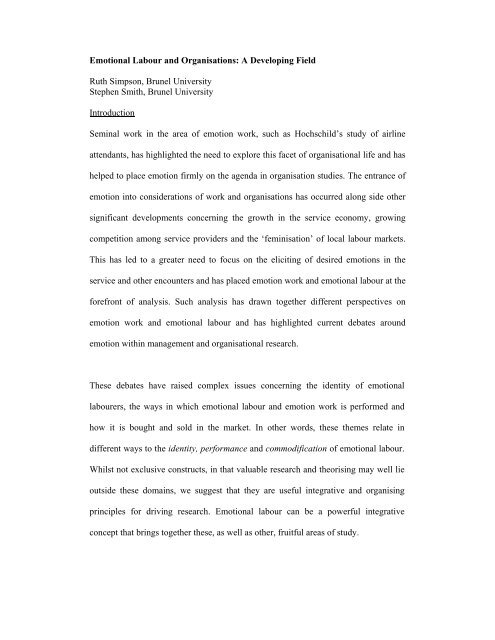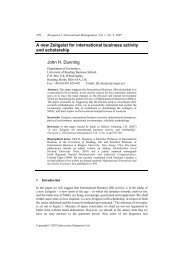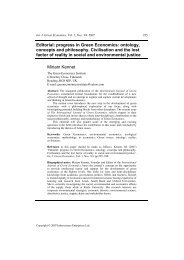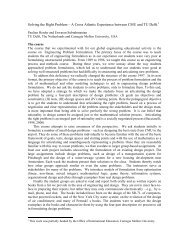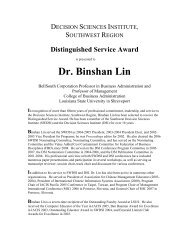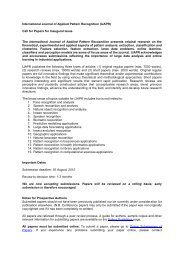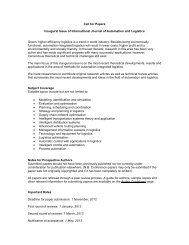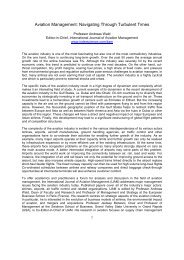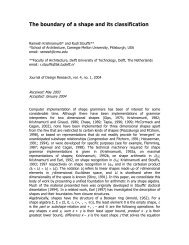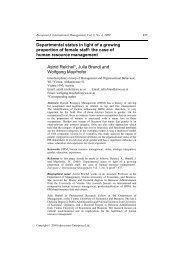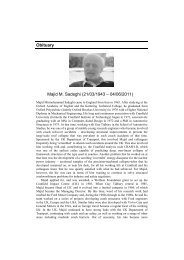Emotional Labour and Organisations: A Developing Field Ruth ...
Emotional Labour and Organisations: A Developing Field Ruth ...
Emotional Labour and Organisations: A Developing Field Ruth ...
You also want an ePaper? Increase the reach of your titles
YUMPU automatically turns print PDFs into web optimized ePapers that Google loves.
<strong>Emotional</strong> <strong>Labour</strong> <strong>and</strong> <strong>Organisations</strong>: A <strong>Developing</strong> <strong>Field</strong><br />
<strong>Ruth</strong> Simpson, Brunel University<br />
Stephen Smith, Brunel University<br />
Introduction<br />
Seminal work in the area of emotion work, such as Hochschild’s study of airline<br />
attendants, has highlighted the need to explore this facet of organisational life <strong>and</strong> has<br />
helped to place emotion firmly on the agenda in organisation studies. The entrance of<br />
emotion into considerations of work <strong>and</strong> organisations has occurred along side other<br />
significant developments concerning the growth in the service economy, growing<br />
competition among service providers <strong>and</strong> the ‘feminisation’ of local labour markets.<br />
This has led to a greater need to focus on the eliciting of desired emotions in the<br />
service <strong>and</strong> other encounters <strong>and</strong> has placed emotion work <strong>and</strong> emotional labour at the<br />
forefront of analysis. Such analysis has drawn together different perspectives on<br />
emotion work <strong>and</strong> emotional labour <strong>and</strong> has highlighted current debates around<br />
emotion within management <strong>and</strong> organisational research.<br />
These debates have raised complex issues concerning the identity of emotional<br />
labourers, the ways in which emotional labour <strong>and</strong> emotion work is performed <strong>and</strong><br />
how it is bought <strong>and</strong> sold in the market. In other words, these themes relate in<br />
different ways to the identity, performance <strong>and</strong> commodification of emotional labour.<br />
Whilst not exclusive constructs, in that valuable research <strong>and</strong> theorising may well lie<br />
outside these domains, we suggest that they are useful integrative <strong>and</strong> organising<br />
principles for driving research. <strong>Emotional</strong> labour can be a powerful integrative<br />
concept that brings together these, as well as other, fruitful areas of study.
Identity<br />
It is widely accepted that work plays a central role in the construction of individual<br />
identity. This is premised on the idea that individual identity can be viewed as a social<br />
product that is produced through narrative <strong>and</strong> performance. Following such<br />
assumptions, questions are raised concerning the congruence between the roles played<br />
inside <strong>and</strong> outside work or between different facets of identity. In this respect, work<br />
identity is an important arena for the constructions of masculinity <strong>and</strong> femininity.<br />
<strong>Emotional</strong> labour has often been constructed as either ‘feminine’ or ‘masculine’:<br />
caring work (teaching, nursing) has been associated with women while custodial <strong>and</strong><br />
disciplinary work (prison work, policing) has been associated with men. The<br />
gendering of emotion work therefore has implications for the identity of emotional<br />
labourers. An underst<strong>and</strong>ing of the ‘identity issues’ around different types of<br />
emotional labour <strong>and</strong> emotion work in organisations as well as of the strategies that<br />
workers adopt to align such roles with their own experience can help to frame<br />
different accounts of these processes in contrasting employment contexts.<br />
Performance<br />
In management terms performance is usually taken to refer to the output <strong>and</strong><br />
efficiency of a system. Of course systems of emotional labour can be thought of in<br />
this way too, measured by the ‘throughput’ of patients in a hospital waiting room or<br />
the time taken dealing with customers at a call centre. But these kinds of<br />
measurements may depend on another meaning of performance, which is more<br />
closely tied to social interaction, as the adequate, above average or exceptional<br />
capacity for acting. Unlike mental <strong>and</strong> manual labour, ‘deep-acted’ emotional labour<br />
can be especially resistant to centralisation, de-skilling <strong>and</strong> direct control. Rules for
expressing sympathy or giving comfort are difficult to write <strong>and</strong> impose while<br />
scripted encounters may be easy to ‘see through’, especially in the context of nonst<strong>and</strong>ard<br />
encounters or enquiries. Attempts to bureaucratically control emotional<br />
labour for example by imposing limits on the length of specific encounters, can lead<br />
to contradictory pressures as workers manage the conflict between the dem<strong>and</strong>s of the<br />
organisation <strong>and</strong> of their ‘clientele’. A fuller underst<strong>and</strong>ing of the function <strong>and</strong><br />
enactment of ‘feeling rules’, of the different types of acting required for authentic<br />
emotion work production in terms of managing the emotions of self <strong>and</strong> of others, <strong>and</strong><br />
the ways in which emotional labourers manage the potential conflict referred to above<br />
is necessary to appreciate the processes underlying emotional labour <strong>and</strong> emotion<br />
work performance.<br />
Commodification<br />
One critical aspect of research into emotional labour has focused on issues around<br />
alienation <strong>and</strong> subjugation. Theorising in this area has tended to rely on images of an<br />
authentic self, that capital subverts <strong>and</strong> then moulds in its own image. However, the<br />
frequent ‘sanctification’ of emotional labour <strong>and</strong> assumed preciousness of such work<br />
may not fully reflect the meanings ascribed to it by emotional labourers themselves or<br />
by recipients of such work - both of whom may prioritise a more instrumental<br />
approach. Similarly, the terms <strong>and</strong> assumptions on which emotional labour is bought<br />
<strong>and</strong> sold as well as the expectations <strong>and</strong> experiences of employees may variously<br />
support or refute the notion of emotional labour as an example of exploitation <strong>and</strong><br />
control. The implications of commodification for the interface between employee,<br />
‘end user’ <strong>and</strong> organisation is a further area of inquiry which can throw light on some<br />
of the moral <strong>and</strong> ethical considerations around such work.
Conclusion<br />
These issues go to the heart of normative debates around the concept of emotion work<br />
<strong>and</strong> emotional labour. Recent work has accordingly reflected on core tensions within<br />
different traditions of emotion research, on the impact of commercialisation on<br />
emotional life <strong>and</strong> on well-being at work <strong>and</strong> has explored aspects of emotional<br />
labour in different work <strong>and</strong> employment settings. All these themes offer insights into<br />
the performance of emotional labour <strong>and</strong> some of the consequences of such work for<br />
workers, managers, customers <strong>and</strong> clients. A rich research field indeed!<br />
Reference<br />
Hochschild, A. (1983) The Managed Heart. Berkeley: University of California


